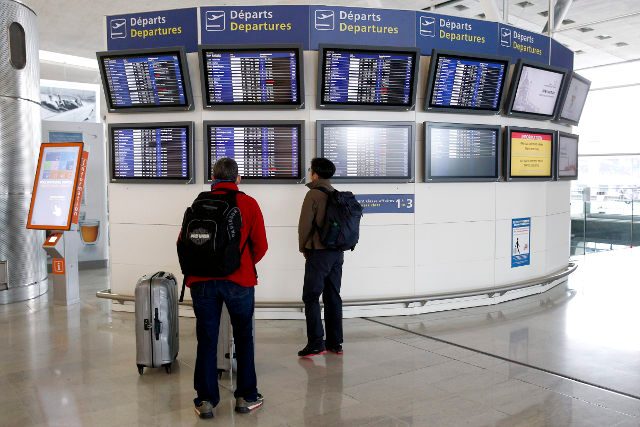SUMMARY
This is AI generated summarization, which may have errors. For context, always refer to the full article.

PARIS, France – Angry French taxi drivers blocked key roads with burning tyres on a “black Tuesday” that also saw hundreds of flights cancelled as air traffic controllers joined civil servants, hospital workers and teachers for a day of strikes on January 26.
At Orly airport, one protester was injured in the leg when a shuttle bus forced its way through a blockade. Police said the bus driver was arrested.
Some 300 taxi drivers, furious over upstart competitors such as Uber, also blocked the capital’s ring road at a key intersection in the west of the city, lighting fires and throwing smoke bombs.
“Today our survival is at stake, we are fed up of meetings and negotiations,” said Ibrahima Sylla, spokesman of the Taxis de France collective.
Nineteen protesters were arrested from a total of 1,200 drivers on strike around the capital, police said.
“There is a right to protest… even during a state of emergency,” said Prime Minister Manuel Valls. “But violence is unacceptable.”
Adding to the chaos, one in five flights in and out of Paris – affecting both Orly and Charles de Gaulle airports — were cancelled because of a strike by air traffic controllers over pay and conditions.
Air France said it would operate all its long-haul flights and more than 80% of its short and medium-haul flights in France and elsewhere in Europe, but that “last-minute delays or cancellations cannot be ruled out.”
Budget airline Ryanair said it had cancelled more than 200 flights, and EasyJet had cut 35 flights, mostly within France but also affecting Italy, Switzerland and Spain.
The taxi strike could also mean access to airports in Paris, Toulouse, Bordeaux, Marseille was “greatly disrupted”, Air France warned.
France banned Uber’s low-cost UberPOP service – which used unlicenced drivers – a year ago, but taxi dispatchers in Paris say business has still shrunk by 20% to 30%.
Uber flouted the UberPOP ban for several months, triggering a spate of violent protests in June.
The San Francisco-based company finally shut down the low-cost service in July after two of its French bosses were arrested and charged with “misleading commercial practices (and) complicity in the illegal exercise of the taxi profession”.
Demos across France
Meanwhile some 5.6 million civil servants have been called to down tools to protest against labor reforms proposed last September affecting pay and career advancement.
Kindergarten and primary school teachers were striking Tuesday for higher pay, with about a third, or 100,000, expected to take part, according to their union, which predicts a stay-away rate of up to 45% in Paris.
The leftist FO union says that, with inflation, a July 2010 freeze on the index used to calculate salaries has cost civil servants eight percent of their purchasing power.
The striking unions – who led up to 120 demonstrations across France on what the daily Le Parisien dubbed “black Tuesday” – also claim they are protesting against job losses totalling some 150,000 since 2007 and say the hospital sector is especially in need of new jobs.
Civil Service Minister Marylise Lebranchu said upcoming negotiations in February could not be expected to lead to a “big rise (in the salary index) because we are in a difficult situation.”
She said austerity measures involving the civil service had achieved seven billion euros ($7.6 billion) in savings.
Jean-Marc Canon of the hardline CGT union said Monday any increase would be “light years from what we want”, demanding that wages keep up with inflation as well as “significant measures aimed at recovering the losses since 2010.”
Travellers on Tuesday may also encounter roadblocks set up by a different set of protesters: farmers upset over falling prices.
The farmers’ unions are demanding that distributors and major food companies pay equitable prices for their produce and livestock.
The government responded on Tuesday by pledging an extra 290 million euros in support for farmers affected by the crisis. – Gina Doggett, AFP/Rappler.com
Add a comment
How does this make you feel?
There are no comments yet. Add your comment to start the conversation.